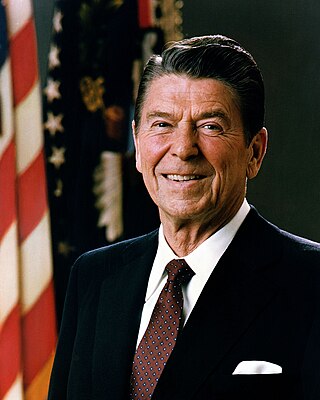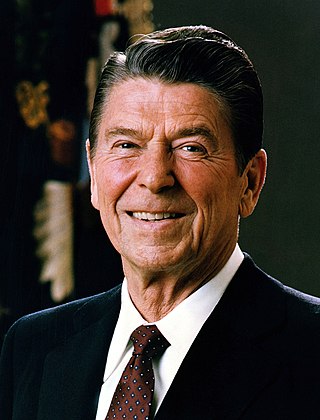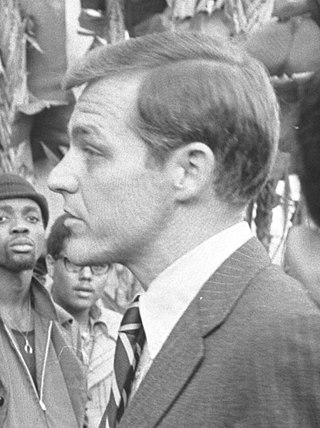Related Research Articles

Nancy Davis Reagan was an American film actress and First Lady of the United States from 1981 to 1989. She was the second wife of president Ronald Reagan.

Ronald Wilson Reagan was an American politician, union leader, and actor who served as the 40th president of the United States from 1981 to 1989, the 33rd governor of California from 1967 to 1975, and the president of the Screen Actors Guild from 1947 to 1952 and 1959 to 1960.

The 1984 United States presidential election was the 50th quadrennial presidential election. It was held on Tuesday, November 6, 1984. Incumbent Republican President Ronald Reagan defeated Democratic former Vice President Walter Mondale, in a landslide, winning 525 electoral votes and 58.8 percent of the popular vote. No other candidate in history has matched Reagan's electoral vote total. This is the most recent US presidential election in which a candidate received over 500 electoral votes, as well as the most recent election in which both major party candidates are deceased, and the last time that a major party candidate failed to carry more than 100 electoral votes.

A respiratory therapist is a specialized healthcare practitioner trained in critical care and cardio-pulmonary medicine in order to work therapeutically with people who have acute critical conditions, cardiac and pulmonary disease. Respiratory therapists graduate from a college or university with a degree in respiratory therapy and have passed a national board certifying examination. The NBRC is responsible for credentialing as a CRT, or RRT,

Martin Luther King Jr. Day is a federal holiday in the United States marking the birthday of Martin Luther King Jr. It is observed on the third Monday of January each year. Born in 1929, King's actual birthday is January 15. The holiday is similar to holidays set under the Uniform Monday Holiday Act. The earliest Monday for this holiday is January 15 and the latest is January 21.

Ronald Reagan's tenure as the 40th president of the United States began with his first inauguration on January 20, 1981, and ended on January 20, 1989. Reagan, a Republican from California, took office following a landslide victory over Democratic incumbent President Jimmy Carter in the 1980 presidential election. Four years later, in the 1984 election, he defeated Democrat former vice president Walter Mondale to win re-election in a larger landslide. Reagan was succeeded by his vice president, George H. W. Bush. Reagan's 1980 election resulted from a dramatic conservative shift to the right in American politics, including a loss of confidence in liberal, New Deal, and Great Society programs and priorities that had dominated the national agenda since the 1930s.
National Hispanic Heritage Month is annually celebrated from September 15 to October 15 in the United States for recognizing the contributions and influence of Hispanic Americans to the history, culture, and achievements for the United States.
In the United States, National Ice Cream Month is celebrated each year in July, and National Ice Cream Day is celebrated on the third Sunday in July.
National Sanctity of Human Life Day is an observance declared by several United States Presidents who opposed abortion typically proclaimed on or near the anniversary of the Supreme Court's decision in Roe v. Wade.
Ronald Reagan was the 40th President of the United States (1981–1989). A Republican and former actor and governor of California, he energized the conservative movement in the United States from 1964. His basic foreign policy was to equal and surpass the Soviet Union in military strength, and put it on the road to what he called "the ash heap of history". By 1985, he began to co-operate closely with Soviet leader Mikhail Gorbachev–they even became friends–and negotiated large-scale disarmament projects. The Cold War was fading away and suddenly ended as Soviets lost control of Eastern Europe almost overnight in October 1989, nine months after Reagan was replaced in the White House by his vice president George H. W. Bush, who was following Reagan's policies. The Soviet Union itself was dissolved in December 1991. In terms of the Reagan doctrine, he promoted military, financial, and diplomatic support for anti-Communist insurgencies in Afghanistan, Nicaragua, and numerous other countries. For the most part, local communist power collapsed when the Soviet Union collapsed.

Caribbean Basin Economic Recovery Act of 1983 (CBERA) — P.L. 98-67, Title II, authorized unilateral preferential trade and tax benefits for eligible Caribbean countries, including duty-free treatment of eligible products.

The speeches and debates of Ronald Reagan comprise the seminal oratory of the 40th President of the United States. Reagan began his career in Iowa as a radio broadcaster. In 1937, he moved to Los Angeles where he started acting, first in films and later television. After delivering a stirring speech in support of Barry Goldwater's presidential candidacy in 1964, he was persuaded to seek the California governorship, winning two years later and again in 1970. In 1980, as the Republican nominee for president of the United States, he defeated incumbent Jimmy Carter. He was reelected in a landslide in 1984, proclaiming that it was "Morning in America". Reagan left office in 1989.

The 1986 State of the Union Address was given by the 40th president of the United States, Ronald Reagan, on February 4, 1986, at 9:00 p.m. EST, in the chamber of the United States House of Representatives to the 99th United States Congress. It was Reagan's fifth State of the Union Address and his sixth speech to a joint session of the United States Congress. Presiding over this joint session was the House speaker, Tip O'Neill, accompanied by George H. W. Bush, the vice president.

Aviation Drug-Trafficking Control Act of 1984 is a United States Federal law amending the Federal Aviation Act of 1958. The statutory law authorized criminal penalties for the unlawful aerial transportation of controlled substances. The Act of Congress mandated the revocation of aircraft registrations and airman certificates by the Federal Aviation Administration whereas an aircraft aviator knowingly engages in the transit of illicitly used drugs. The Act established authority and a statute of limitations for the reissuance of airman certificates by the United States Secretary of Transportation.

William Slater Banowsky was an American academic administrator. He served as president of Pepperdine University from 1971 to 1978, then as president of the University of Oklahoma from 1978 to 1982 when he resigned to become President of the Los Angeles Area Chamber of Commerce. In 1983, Banowsky returned as OU president and served for two more years. Banowsky was also a member of the Republican National Committee for the state of California from 1973 to 1975.
The presidency of Ronald Reagan began on January 20, 1981, when Ronald Reagan was inaugurated as the 40th president of the United States, and ended on January 20, 1989.
The 1983 motorcycle tariff, or Memorandum on Heavyweight Motorcycle Imports, was a presidential memorandum ordering a 45% tariff on motorcycles imported to the United States, signed by President Ronald Reagan on April 1, 1983, on the US International Trade Commission's (USITC) recommendation to approve Harley-Davidson's petition for import relief. The tariff expired in 1988.
References
- ↑ Respiratory Care August 1997 Volume 42, Number 8 pg. 748—817
- ↑ United States President Ronald Reagan — Proclamation 5095 — National Respiratory Therapy Week, 1983, September 15, 1983
- ↑ Ronald Reagan: "Proclamation 4997 - National Respiratory Therapy Week," November 10, 1982. Online by Gerhard Peters and John T. Woolley, The American Presidency Project. http://www.presidency.ucsb.edu/ws/index.php?pid=41974.